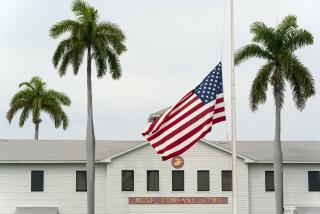2 Youths Held in Australia Seek Asylum After Escape
- Share via
SINGAPORE — Two young brothers who escaped from a detention center in central Australia after spending 18 months behind bars walked into the British Consulate in Melbourne on Thursday and applied for asylum.
Hours later, however, British Foreign Minister Jack Straw refused to accept their application and British officials handed the boys, ages 12 and 14, over to Australian authorities, attorneys for the family said.
The sudden turn of events further complicates an already complex family saga in which the boys’ father, Ali Asqar Bakhtiari, was granted entry into Australia as an Afghan refugee but the rest of the family members--who arrived after he did--were denied asylum and incarcerated at the Woomera detention center.
The brothers, Alamdar, 14, and Montazar, 12, were among 35 detainees who escaped from Woomera on June 27 when activists used a car to pull down a section of the facility’s fence. In March, dozens of Woomera detainees also escaped after a fence was knocked down.
A majority of the escapees were caught, but the brothers were part of a small group that eluded pursuers in the outback. Apparently with the help of supporters, the boys eventually made their way to Melbourne, about 620 miles southeast of Woomera.
Wearing baseball caps and backpacks, they arrived at the British Consulate with an unidentified woman who left them there. Television footage showing the brothers inside the consulate was broadcast around the world.
Australia incarcerates all asylum seekers, including children, until their claims are processed. Some children have been held for years as they waited.
The Bakhtiari brothers had been so depressed in custody that the detention center staff had feared for their safety. At one point, Alamdar carved the word “Freedom” into his arm with a razor blade. Montazar threatened to kill himself.
“It’s exactly like a prison,” Alamdar told The Times in March during a telephone interview from Woomera. “It’s impossible to live in this camp.”
Eric Vadarlis, an attorney representing the boys, criticized the British government’s decision not to consider their asylum application. He charged that by doing so Britain had endorsed Australia’s policy of “locking up children who have done nothing wrong.”
The Bakhtiari family’s case is unusual because Ali was granted permission to live in Australia in August 2000 while his wife, Roqia, and their five children were denied asylum when they arrived on Jan. 1, 2001.
The official who heard Ali’s case accepted his explanation that he was an Afghan farmer who fled his homeland after he was arrested by the Taliban. The official who considered Roqia’s application concluded that she was from Pakistan because she did not know enough about life in Afghanistan, including the currency and geography.
She said in an earlier telephone interview that she had been unable to answer such questions because, as a woman in the restrictive Afghan society, she had never seen money or left her village until she fled the country.
Earlier this year, Immigration Minister Philip Ruddock denied a request to release Roqia and the children on humanitarian grounds. He insists that Australian law does not provide for asylum seekers’ families to be reunited.
Lawyers for the family have filed suit, contending that Roqia and the children should be freed because they are part of Ali’s family unit. Australia’s high court will hear the case in September.
The government has responded by seeking to remove Ali’s protective visa on the grounds that anonymous witnesses say he is a plumber from Pakistan.
“In our view they are Pakistani, not Afghani,” Ruddock told reporters Thursday in Sydney, adding it was inappropriate that Ali had received a visa in the first place.
Ali has countered with named witnesses who corroborate his account and say they knew him in Afghanistan.
By escaping from Woomera, however, the boys might have provided the government with sufficient cause to deport them, even if the rest of the family is granted protection by the high court. Under Australian law, detainees who are convicted of escaping from custody can be denied asylum even if they are otherwise qualified.
Before Britain’s refusal to hear the boys’ application, Vadarlis described them as “very, very scared.”
“They know if they step outside the consulate, the police will lock them up,” he told reporters. “It’s a terrible situation.”
More to Read
Sign up for Essential California
The most important California stories and recommendations in your inbox every morning.
You may occasionally receive promotional content from the Los Angeles Times.













